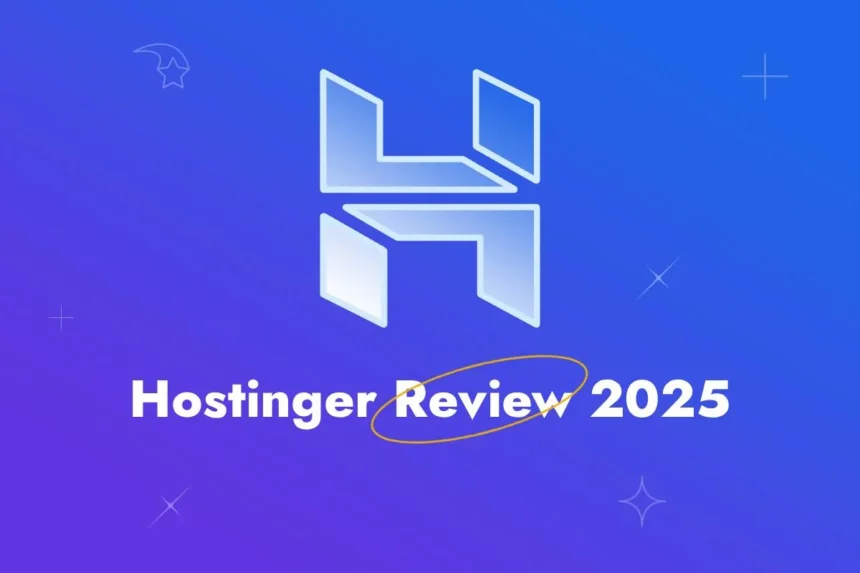If you’ve ever tried building a website, you know the process feels like entering another universe full of jargon, confusing plans, upsells, and technical chaos nobody warned you about. At some point, you end up on Google searching:
“Best affordable hosting for beginners.”
And in that moment, Hostinger almost always appears.
It’s one of those platforms people keep recommending. YouTubers swear by it, bloggers list it as their top pick, and even developers mention it occasionally with a respectful nod.
But let’s pause and ask the real question:
Is Hostinger actually good, or is it just good marketing?
That’s exactly what this review aims to answer without unnecessary hype or fear-based persuasion.
So grab a coffee, sit back, and let’s walk through Hostinger from a real-world perspective: usability, pricing, speed, reliability, support, and long-term value.
The First Impression: Simple, Clean, Not Overwhelming
The first thing you notice after signing up is the dashboard.
Some hosting platforms look like airplane cockpits, tons of buttons, settings, warnings, and technical tools that make no sense unless you’re a server engineer.
Hostinger takes the opposite approach.
The layout feels clean. The labels make sense. You don’t get lost. Even if you’ve never touched hosting in your life, you’ll understand what you’re looking at.
No:
- Scary terminal screens
- Hard-to-find settings
- Confusing navigation
Everything feels structured.
You’ll find sections for:
- Email accounts
- Backups
- SSL
- Website builder
- Domains
- WordPress tools
It feels friendly. Not dumbed down, just thoughtfully simplified.
If you’re someone who gets overwhelmed easily with tech, this alone makes Hostinger attractive.
Pricing: The Big Reason Everyone Talks About Hostinger
Let’s be honest, one of the biggest attractions is the pricing.
Most hosting platforms follow a predictable pattern:
- Cheap entry price
- High renewal
- Expensive add-ons
Hostinger follows that same industry model, but the difference is that the baseline prices are genuinely lower.
Even after renewal, it’s still competitive.
The most affordable plan is great for personal projects, small websites, or experimental ideas. You don’t feel the pressure of spending too much upfront, especially when you’re not sure how big your website will become.
Here’s the best way to think about it:
- If you’re launching your first blog, Hostinger won’t feel financially risky.
- If you’re running a small business website, it won’t feel overpriced.
- If you grow later, upgrading is smooth, not painful.
So yes, the pricing is absolutely one of Hostinger’s strongest selling points.
Speed and Performance: Surprisingly Good for Shared Hosting
Now let’s get into something that actually matters long-term: speed.
You might think, “Speed is just about internet connection.”
Not really.
When someone visits your website, their browser sends a request to the server. If the server responds slowly, your page loads slowly, even if you have blazing fast internet.
A slow website means:
- Lower Google rankings
- Higher bounce rates
- Lower conversion rates
People simply don’t wait.
Hostinger uses LiteSpeed technology and built-in caching, which gives websites a noticeable performance boost.
Even on their lowest plan, websites load fast — especially WordPress.
No one expects premium-level speeds from budget hosting, but Hostinger delivers more than you’d assume at this price point.
It feels balanced: affordable, yet fast enough for modern website expectations.
Website Builders and WordPress Experience
Some people prefer drag-and-drop website builders. Others prefer WordPress. Hostinger supports both.
If you’re a WordPress user:
You’ll appreciate:
- Auto installation
- Built-in caching
- One-click staging
- Automatic updates
- Performance optimization tools
It feels smooth and well-integrated.
If you’re not into WordPress:
Hostinger offers its own simple, visual, and beginner-friendly interface. You pick a template, edit text, move elements where you want, and publish. Done.
It’s not as advanced as Elementor or Webflow, but for beginners and small sites, it’s more than enough.
Security: Solid Protection Without Technical Confusion
Security matters even if you think your website isn’t important enough to be targeted.
Hackers don’t care about fame. They look for vulnerable sites to inject ads, send spam emails, or steal user data.
Hostinger includes a few important security features:
- Free SSL
- Malware protection
- 2FA login
- Regular backups (daily or weekly, depending on the plan)
- DDoS protection
The best part? Activating SSL is one click — no complicated setup.
You don’t need to know how encryption works. You don’t need to deal with certificates manually. It just works.
Backups and Recovery: A Safety Net You Don’t Appreciate Until You Need It
Mistakes happen.
One plugin update can break a layout.
One accidental deletion can erase your pages.
One wrong file edit can crash everything.
Hostinger gives you backup options depending on your plan.
Restoring a site takes seconds, and that peace of mind is worth more than people realize.
If you’re running a business website, always choose a plan with daily backups. It’s one of those things you hope you never need, but when you do, you’ll be grateful.
Support: Helpful, Calm, and Beginner-Friendly
Not all hosting support feels supportive.
Some companies respond with:
- Copy-paste messages
- Technical jargon
- Robotic replies
- Delayed solutions
Hostinger’s support feels different.
Their team speaks in normal language, like someone explaining things to a friend. They guide rather than overwhelm. They don’t sound annoyed, even when questions are basic.
There may be short wait times depending on the hour, but once connected, the experience is reassuring.
For beginners, this matters more than speed scores or benchmark graphs.
Sometimes, what you really need is someone saying:
“Don’t worry, I’ll guide you step by step.”
Reliability and Uptime: Stable and Trustworthy
Website downtime isn’t just annoying; it can cost traffic, rankings, and revenue.
Hostinger maintains strong uptime performance. Websites stay online consistently, especially on higher plans.
While no hosting company can promise 100% perfection forever, Hostinger stays reliably high in uptime tests.
There’s a sense of stability, not uncertainty.
Migration: If You’re Moving from Another Host
If you already have a website hosted somewhere else, the idea of migrating can feel stressful.
Hostinger tries to make this easy. They offer a migration tool for WordPress sites that copies content from other hosts automatically.
If you’re not comfortable doing it yourself, support can help.
This feature makes Hostinger useful not only for beginners but also for people who want to escape overpriced hosting.
The Long-Term Experience: How It Feels After Months of Use
Some hosting platforms feel amazing in week one, but frustrating later because of:
- Slow support
- Server overload
- Hidden limits
- Poor uptime
Hostinger maintains consistency. Once your site is up and running, it doesn’t require constant fixing, maintenance, or technical attention. It feels like a platform you can forget about in a good way.
You only remember it exists when:
- You need to update something
- Your business grows, and you upgrade
- You buy another domain
- You check performance reports
It doesn’t demand effort. It quietly supports your website in the background.
Is Hostinger Worth It in 2025?
Yes absolutely.
Not because it’s the cheapest.
Not because it’s the most advertised.
But because it hits the perfect balance:
✔ Simple enough for beginners
✔ Fast enough for modern needs
✔ Affordable enough for new creators
✔ Scalable enough for growing sites
✔ Supportive enough to feel confident
Hostinger doesn’t feel like a gamble; it feels like a smart starting point.
If you’re planning to launch a website this year — whether it’s a blog, store, or business — Hostinger deserves a serious look.
It makes building an online presence feel achievable rather than overwhelming.


